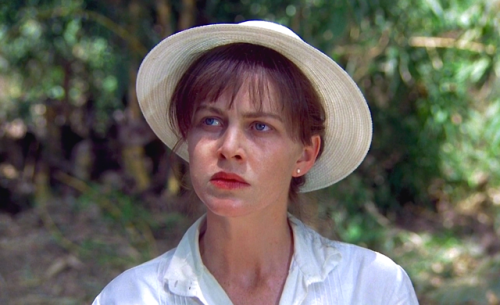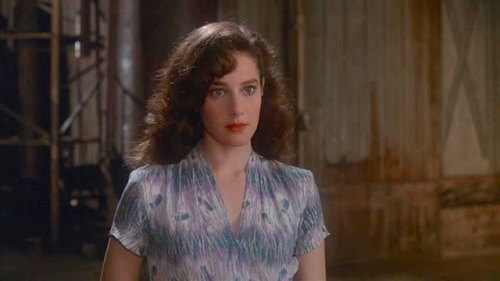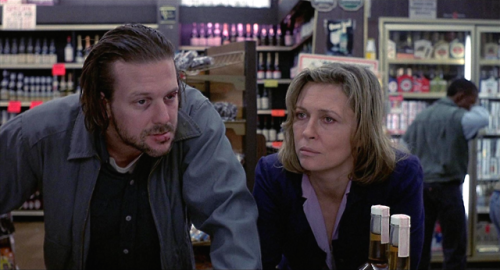#literary
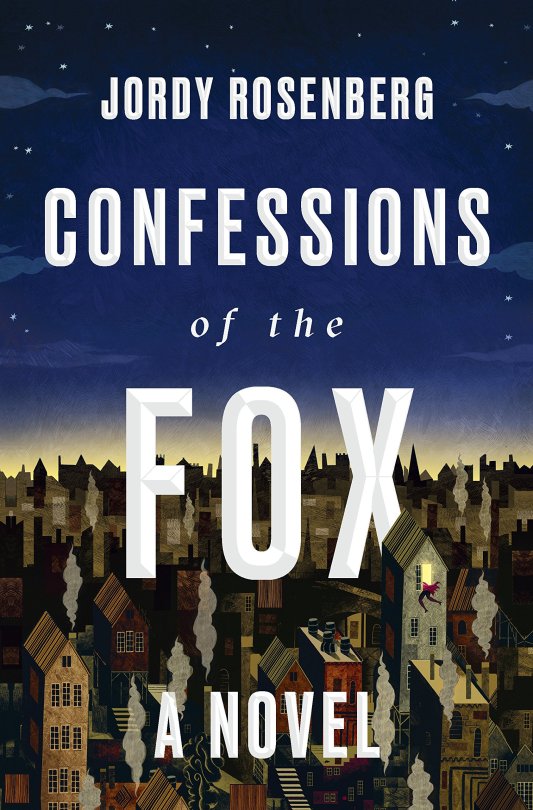
Rating: Great Read
Genre: Historical, Literary
Representation:
-Trans man protagonist(s)
-Intersex protagonist(s)
Trigger warnings: Murder, state violence, police, execution, graphic injury, surgery (graphic), slavery (not in scene), child abuse, self harm, plague
Note: Not YA; features very graphic sexuality
I gasped in delight when I realized, several pages into Confessions of the Fox, what I was reading. I had known beforehand that I was picking up a historical fiction story about the infamous 18th century London thief Jack Sheppard reimagined as a transgender man. What delighted me was the frame story, which is what truly makes the novel something special.
The fictional Dr. Voss is a historian of the 18th century at an unnamed university; he stumbles across an old manuscript at his university library’s book sale, and the student running the sale gives it to him for free. This manuscript touts itself as an extant narrative about Jack Sheppard, previously undiscovered. Voss throws himself into the work of transcribing the document, increasingly fascinated as he discovers that this narrative is alone in several claims it makes about Jack and the characters of his life. First, that Jack is transgender and intersex, and second, that his lover, Elizabeth Lyon (Bess) is Southeast Asian, identifying herself as “Lascar” on her father’s side.
The enormity of this manuscript’s discovery is not lost on Voss’s university, who, holding Voss’s job hostage, demand he editorialize the manuscript so that it can be copyrighted and sold via partnership with a pharmaceutical company purporting to sell “organic” Testosterone. Voss is transgender himself, and while the university doesn’t outright admit that they want his mark on the manuscript for that reason, it is implied.
Thus,Confessions of the Fox becomes two stories in one: the tale of Jack Sheppard and Bess, their jailbreaks, heists, love affair, and run-ins with pirates, mollies, and mutineers; but also the tale told through Dr. Voss’s footnotes on the manuscript, a convincing facsimile of academic commentary. That is, until Voss starts connecting the manuscript to his own life, going “rogue” as he realizes that the manuscript is not what he had first believed it to be (but no spoilers).
The framing, reminiscent of The Princess Bride, is convincing, well-executed, but not so entrenched in research as to be a slog. In fact, I enjoyed the footnotes more than the Jack Sheppard story. Voss’s ruminations on the manuscript, on transgender life in the 18th century, on real documents, such as Narrative of the Life of Frederick Douglass, and real historical events, such as the draining of the Fens, make this novel something really special.
The Jack Sheppard story itself, meanwhile, is straightforward, well-written in its own right, but needs the scaffolding of Voss’s footnotes in order to stand. I was somewhat disappointed by the shape of the plot, which unfolded all at once at the end. There was little space for Jack or Bess to be more than reactive as the plot happened around them. The main reason for the disruption of the pacing was probably the slow on-ramp; Jack’s transition and how it is accomplished takes up the lion’s share of the beginning of the novel, only then moving into the plot with Jonathan Wild and the mutineers, which by comparison, moves much too quickly.
However, issues of pacing that would have made another novel unpleasant to read were ameliorated by the frame story’s focus on the active discoveries about the text Voss shares with the reader as the novel progresses. The slow unravelling of Voss’s revelations about the manuscript, and his conflict with the university over it, keep the reader’s interest even while the “manuscript” itself drags or moves too quickly in parts.
I cannot recommend Confessions of the Fox enough, although there are parts that are very graphic, and might ruin someone else’s reading. Though I wouldn’t necessarily list this as a trigger warning, discerning readers may want to be aware beforehand of the astounding prevalence of urine in the equally prevalent and graphic sexuality of the Jack Sheppard manuscript. Confessions of the Fox is very squarely adult fiction, with little room to be enjoyed as a crossover with YA audiences. I would even go so far to say that Confessions of the Fox has toed the line over into erotic fiction, though it has happily managed to secure its seat as a critical darling anyway, perhaps by nature of its literary qualities and truly thoughtful musings on gender, academia, capitalism, the over-policing of marginalized communities, and most of all, questions of who is permitted to author history, and who must be content to editorialize.
For more from Jordy Rosenberg, visit his website here.

Rating: Great Read
Genre: Realism, Literary
Representation:
-Lesbian main character
-Bisexual supporting character
Trigger warnings: Murder; Cheating; Drug abuse; Addiction; Guns; Human trafficking; Homophobic violence (extreme, not in scene); Threat of homophobic violence; CSA (in character backstory, not in scene); child abuse and neglect; infant death (in character backstory, not in scene)
Note: Not YA; sexually explicit
Jodi McCarty was sentenced to life in prison in 1989, when she was only seventeen. She suddenly finds herself free eighteen years later, and all she wants is to finish what she started eighteen years ago. Back then, she and her girlfriend Paula had dreams to rescue Paula’s little brother from her abusive family. Now that Jodi is out of prison, she picks up where she left off. Only, Ricky is an adult, now. And he isn’t the only person Jodi ends up rescuing.
Miranda Matheson Golden is a foil to Jodi, and Jodi’s lover. Miranda’s childhood was also abruptly severed at seventeen when the much older rock star Lee Golden, hired by her father to be her music teacher, got her pregnant. Her subsequent marriage to Lee was as much a prison sentence as Jodi’s. Years later, separated from Golden, Miranda lives out of a motel, her life split between providing for her sons, working at a bar, and vanishing into drugs and sex.
Jodi’s dream for eighteen years has been to return to her Grandma Effie’s land in the Appalachians - land that was willed to Jodi - and make something of it. But she finds, with Ricky, Miranda, and Miranda’s sons in tow, that it won’t be that easy. There is no such thing as picking up where you left off.
Sugar Run has a lot of moving parts, split across eighteen years. It is a novel that offers stories piecemeal in service of creating a final patchwork, the pattern only clear after the pieces have been sewn in place. The pieces that take place in 1989 slowly tell the story of how Jodi ended up going to prison. Though we know her crime more or less from the beginning of the story, the reader doesn’t learn why she did it until the end. This approach, as we learn more about Jodi and her then-girlfriend Paula’s relationship, keeps the reader turning pages. The present day portions of the novel are equally tense. Rather than building up to an inevitable crime, however, the present day shows the juggling act of trying to survive while life throws one curveball after another.
Sugar Run is a poignant portrayal of how poverty, drug abuse, and petty crime are inevitably linked in Appalachia - and without the condemning (nor clinical) gaze of an outsider writing a “study.” Above all, Sugar Run is a journey of self-discovery - a delayed bildungsroman for a woman whose coming of age was cut short. And in that self-discovery, Jodi discovers just what kind of net she finds herself trapped in on probation in Appalachia.
As Jodi is increasingly boxed in by compounding limitations of poverty, homophobia, misogyny, and the fact that she’s marked as an ex-con, the novel shows the lengths she must go to just to live. While much of the novel is about Jodi’s internal world, external factors are the lion’s share of Jodi’s problems. She doesn’t have the luxury of dwelling on guilt, for example, when she has to worry about the safety of her chosen family first. And that danger escalates in extreme measure before the novel ends. In Jodi’s world, violence isn’t something a person can say “no” to just because one is on probation. Looking the other way rather than fighting back means allowing that violence to happen to someone else - either way, while you may not be culpable with the law, you’re culpable to yourself.
I have been chewing over the ending of the novel for several weeks in preparation for this review. Sugar Run doesn’t have a traditional plot, being a character-driven novel, and so doesn’t fulfill a traditional resolution. Yet for a character-driven novel, escalating external factors give Jodi’s arc the ending one would expect from a Western. Sugar Run holds itself up as realism, but there is something cowboy-ish about this novel. Murder, shoot-outs, rescue missions, armed robbery, and extortion are all presented as if they are as inevitable to Appalachian life as going out for a beer. Perhaps this is part of the point of the novel - Jodi’s Romantic vision of herself as one of the old guard, her dream of living off her grandmother’s land in the traditional way, is, like the ending of the novel, more genre fiction than reality. Or, interpretted another way, Jodi cannot have one without the other. Living off the land, being a cowboy, comes hand in hand with the brutal, larger than life consequences of living outside of the bounds of the modern world.
I recommend Sugar Run. It has the lilting, introspective tone of a literary novel, but unpretentiously in service of a character and story which have earned the elevated treatment - especially considering there is no lack of external conflict to move the story along. It’s a rough read, about characters who lead tangled, painful lives, and who struggle to see themselves as more than victims, as bad circumstances compound into worse ones. The list of trigger warnings may be lengthy, but never give a sour, hopeless taste to the book. For lovers of deep character study and richly realized settings, you couldn’t do better than Sugar Run.
For more from Mesha Maren, visit her website here.
fuck literary gatekeeping, read whatever you want.

Susan Sontag, As Consciousness Is Harnesses To Flesh
“When you were away from me you were still present in my art…. Of course I never let you know anything about this.”
The Picture of Dorian Gray, Oscar Wilde
“Books are the mirrors of the soul.”
Between the Acts,Virginia Woolf
“You can aim for my heart, go for blood. But you would still miss me in your bones.”
my tears ricochet (folklore),Taylor Swift
“I can never be all the people I want and live all the lives I want. I can never train myself in all the skills I want. And why do I want? I want to live and feel all the shades, tones and variations of mental and physical experience possible in my life.“
The Unabridged Journals of Sylvia Plath,Sylvia Plath
“If a man treats life artistically, his brain is his heart.”
The Picture of Dorian Gray,Oscar Wilde
“From the moment I met you, your personality had the most extraordinary influence over me. I was dominated, soul, brain, and power by you. You became to me the visible incarnation of that unseen ideal whose memory haunts us artists like an exquisite dream. I worshipped you. I grew jealous of everyone to whom you spoke. I wanted to have you all to myself. I was only happy when I was with you.”
The Picture of Dorian Gray,Oscar Wilde
Freehanded some space into a “42” for Mike!
#hitchhikersguide #literarytattoo #literary #book #booklover #scifi #tattoo #toronto #torontotattoo #neotatmachines #TattoosThisWay #AlieK (at Tattoos This Way)
https://www.instagram.com/p/CbBuD8Ot-n2/?utm_medium=tumblr
Post link
It’s really hard to know what day it is when working at home and being quarantined, but I did remember that today is indeed #FanRequestFriday
Make your suggestions all day and I will combine them with all the suggestions made during the rest of the week and choose one and draw it up and post it Monday.
I will offer it to whoever suggested it for a discount and if that person passes it will be available to everyone else to buy.
Your suggestions can be anything -# Marvel, #DC, #Indie, #retro, #rule63, #mashup, #literary, #film - virtually anything.
Everyone PLEASE be safe and practice social distancing! #xmenevolution #swanprincess #FireandIce #coolworld #commission #fanart #disney #animation ##ComicSketches #pencilart
https://www.instagram.com/p/B-hVu89A-nC/?igshid=1dzwhk8br3vo3
Post link
I may never be happy, but tonight I am content.
— Sylvia Plath, The Unabridged Journals of Sylvia Plath
Because everyone loves someone, and anyone who loves someone has had those desperate nights where we lie awake trying to figure our how we can afford to carry on being human beings. Sometimes that makes us do things that seem ridiculous in hindsight, but which felt like the only way out at the time.
—Fredrik Backman, Anxious People.

Partly because in your orange shirt you look like a better happier St. Sebastian
partly because of my love for you,
partly because of your love for yoghurt
partly because of the fluorescent orange tulips around the birches
partly because of the secrecy our smiles
take on before people and statuary.
—Frank O'Hara, Having A Coke With You.
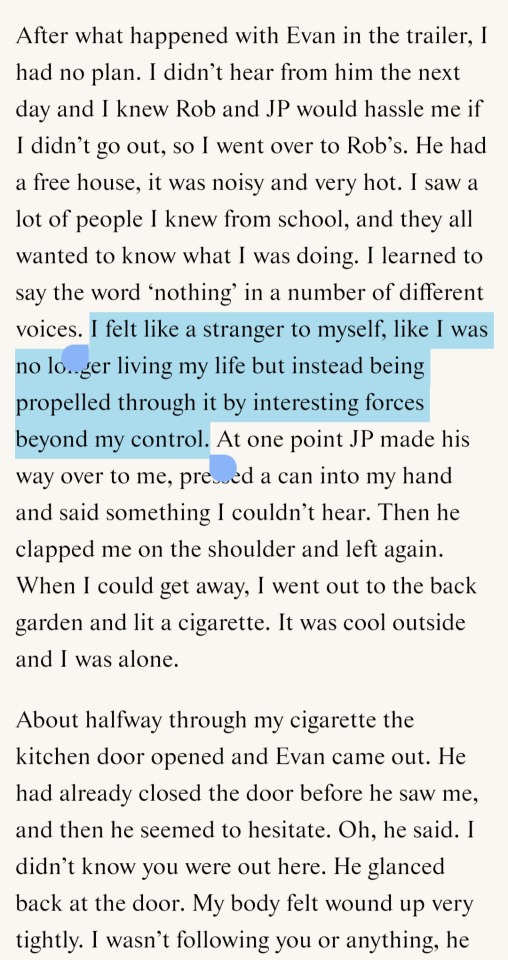
I felt like a stranger to myself, like I was no longer living my life but instead being propelled through it by interesting forces beyond my control.
— Sally Rooney, Concord 34.
Maybe eventually we will just drop out of each other’s lives, or become friends after all, or something else. But whatever happens will at least be the result of this experiment, which feels at times like it’s going badly wrong, and at other times feels like the only kind of relationship worth having.
Sally Rooney, Beautiful World Where Are You.
Oscar Wilde was profoundly affected by the loss of his sister Isola and wrote the now famous poem “Requiescat” in her memory. He carried a lock of her hair in a decorated envelope until the end of his life. According to Oscar, Isola lit up their lives like “a golden ray of sunshine dancing about our home.” ☀️ #oscarwilde #oscarwildequotes #ireland #cemetery #grave #gravestone #isolawilde #irishwriter #literary #literature #poem #poetry #inmemory #Requiesvat #graveyard #sister (at Edgeworthstown)
Post link
“If I had a flower for every time I thought of you…I could walk through my garden forever.” -Alfred Tennyson
Post link
I think if I were to love you like the sun’s warmth dancing on my skin, maybe, just maybe I’d love to bathe in you once more. You were gentle and full of light, touching me just as lightly as the sun did. Creeping up on me ever so slightly, and in that moment, when the sunlight hit my leg- I miss you.
Poem by Me
Review:The Silence of the Girls
Author: Pat Barker
Genre: Fiction, revisionism, mythology
Revisionist fiction or retellings still fill bookshelves to the brim these days—old fables pop up with shocking twists, we see fairytales shed their Disney-fied formula to give newer nods to their darker roots, and we even come to know stories of antiquity thrown in with “cyber” sensibilities. With the unremitting creativity of writers today, the possibilities are endless. Readers may clamor for something “original”, of course, but I find that there is charm in revisiting familiar narratives refashioned for the modern eyes.
Personally, I enjoy reading reimaginings of classic myths. I was rapt, for instance, while leafing through the story of the tragic Greek hero Achilles and his bosom companion Patroclus in Madeline Miller’s The Song of Achilles. I devoured Circe, a feminist take on a classic character from Homer’s The Odyssey by the same author, with equal fascination. There is also Margaret Atwood’s The Penelopiad, spun from the decades-long wait of Penelope for her husband Odysseus from the Trojan War. None of these felt old to me. In fact, they gave substantial and refreshing heft to the original materials. Since then, I’ve been on the prowl for modern narrations of old legends.
That’s why when I heard about Pat Barker’s The Silence of the Girls—events of The Iliad, but told from the perspective of a significant female character—I just know I have to grab a copy.
The Silence of the Girls gives a #MeToo voice to the women of Homer’s epic poem, particularly to Briseis, who becomes the “war prize” of Achilles after the Greeks sacked their kingdom. Hark back to your high school required reading days and you may remember that in the story, as a prize of honour, Briseis is the linchpin of the quarrel between Achilles and Agamemnon. The feud resulted to the former withdrawing from the battle against the Trojans, almost bringing defeat to their side. No more than a “status symbol,” Briseis is virtually voiceless there; we are deaf to what she feels, or what any woman in the story (who isn’t a goddess, for the immortals have a lot to say regardless of gender) has to convey other than grief and sorrow.
In this book, she introduces the readers to the margins of the largely masculine framework of the Homeric poem, swinging the spotlight from swift-footed, angry halfgods and bouts for glory to the harrowing truths that the war’s “collateral damages” must suffer. Barker’s pen made their lives palpable on the pages: we get to take a peek at the “rape camp,” we meet bed-slaves, former queens made to scrub dirt, young girls who get their throats slit to appease the dead or some wrathful deity, mothers who’ve helplessly watched their husbands and children get butchered. There’s blood and spit and sweat and tears, and not just in the battlefield. Barker truly doesn’t pull any punches here.
But true to its title, Briseis’ thoughts remain either in her head only, with the readers as the only witness, or with their small circle of bed-girls. “Silence becomes a woman,” a character reminds her of an adage twinned with their fates for all their lives. The book, in effect, becomes a psychological journey of individuals “muted” by their male-dominated society. “They were men, and free,” Briseis says. “I was a woman, and a slave. And that’s a chasm no amount of sentimental chit-chat about shared imprisonment should be allowed to obscure.”
Surprisingly, the novel is not told from Briseis’ perspective alone. We get brief chapters of Achilles’ thoughts, too, starting in the second volume. The first shift of voices was jarring, and my initial thought is that this defeats the very purpose of the book, which is to give a platform to her experiences. But I think this change is understandable and necessary, as Briseis is absent at the turning point of The Iliad that made Achilles go back to war again: the death of Patroclus, Achilles’ beloved friend. The inserts also provide a helpful crutch to the portrayal of these men, where we see them get fleshed out past the observing eyes of the sidelined victims—they are characters, too, after all, and not just one-dimensional, violent caricatures. Scenes in the battlefield are a welcome change as well. Barker’s descriptive writing is magic, and the readers get treated with vivid images such as this:
“On the battlefield, the Greeks fighting to save Patroclus’s corpse recognize the cry and run towards it. What do they see? A tall man standing on a parapet with the golden light of early evening catching his hair? No, of course they don’t. They see the goddess Athena wrap her glittering aegis round [Achilles’s] shoulders: they see flames thirty feet high springing from the top of his head. What the Trojans saw isn’t recorded. The defeated go down in history and disappear, and their stories die with them.”
While most of the iconic scenes are recreated well (Achilles’ howling grief as he receives news of Patroclus’ demise at the hands of Hector, his berserker’s wrath while dragging Hector’s dead body around the gates of Troy, Priam’s visit to Achilles to retrieve his son’s dishonored corpse), I wished that Barker zeroed in more on the lives of the women at the camp. While reading the book, the Bechdel Test came to mind—will this even pass it? The lives of these girls maybe forever entwined with men, but they have their pasts to speak of, to make them rounder as characters. When Nestor tells Briseis to forget her past, I was hoping for a silent revolt. “Forget,” Briseis thinks of the order. “So there was my duty laid out in front of me, as simple and clear as a bowl of water: remember.” The rebellion seemed to have petered out early.
The writing style would have been impeccable if it weren’t for the anachronisms strewn across the whole thing, modern phrases that stick out. I’ve heard that Barker said this is deliberate on her part to emphasize the tale’s timelessness, but some of them just don’t fit, like pieces squeezed into the wrong puzzle. Still, for the most part, the narrative is a magnificent treat.
Unflinchingly honest, The Silence of the Girls is a significant work of fiction that would be best read right after The Iliad itself.
Post link
Análisis de “Sueño del Marinero”, de Alberti
Os invito a analizar el primer poema de “Marinero en Tierra” del autor Rafael Alberti.
Día y Hora: El miércoles 28 de abril de 2021, de 17:45 a 18:45h (España).
Para acceder al canal, haz click en la invitación.

Edgar Allan Poe








Mi amigo el pollito
La vida es compleja, te presenta personas que valen un montón y te hace pensar que toda la eternidad te van a durar; si fuera verdad, creo que no sabríamos la amistad valorar. Aún recuerdo cuando lo conocí; amarillo y bonito cuando lo ví, nadie lo esperaba, pero apareció y en mi mejor amigo se convirtió. Sabía que algún día tenía él que empacar y sus alas poner a volar, pero no pensé que lo extrañaría más de lo normal. Nunca imaginé que mi corazón tanto lo fuese a querer y que nuestra amistad tan especial podría ser, por eso, aquí o allá, sé que nuestra amistad durará.

Credit:George McCalman
The content we consume and its authenticity are called into question on a daily basis. But just 50 years ago, this was far from a common way to engage with art, culture and literature. That all changed with Barbara Christian.
From a young age, Christian was an avid reader, questioning why there were no African American or Afro Caribbean women included in the books she read. Born and raised in the U.S. Virgin Islands, she dedicated her life to changing ideas about race, gender and class, particularly around the representation of black women in American literature, ultimately asking, “who gets to tell their stories?”
While pursuing a graduate degree in literature at Columbia University, Christian became friends with Langston Hughes and was introduced to the works of many black writers. Her exploration of these writings would be realized later in her career — she was one of the first scholars to bring the works of Toni Morrison and Alice Walker to the attention of academia.
In 1972, two years after graduating from Columbia, Christian became an assistant professor at UC Berkeley. She was pivotal in creating the university’s African American studies department and, in 1978, was the first African American to be granted tenure. “She was a path-breaking scholar,” said Percy Hintzen, chair of the UC Berkeley department of African American studies. "Nobody did more to bring black women writers into academic and popular recognition.”
For so long, the majority of representations of black women in literature were crafted by white writers. Christian wanted to change that. Her theories provided a foundation for black women to assert control over their own image in American literature. Her 1980 study, “Black Women Novelists: The Development of a Tradition,” was the first of its kind to look at black feminist literature from the nineteenth century to contemporary times. In her lifetime, Christian truly pioneered the birth of black women’s literary criticism and theory.
“I can only speak for myself. But when I write and how I write is done in order to save my own life. And I mean that literally,” she noted. “For me literature is a way of knowing that I am not hallucinating, that whatever I feel/know is.”




Wonder Pens in Toronto, a stationery institution (comes with 2 shop cats, a skylight, and plants)
When you’re picking out a fountain pen they let you test them out to feel the ~connection~ - move over Ollivander
HUBO UN TIEMPO EN EL QUE NUESTRO CORAZÓN ALBERGÓ ALGO DENTRO QUE ERA MÁS GRANDE QUE EL MUNDO ENTERO

Siempre cruzan por mi mente, como un río, esas evocaciones de infinita nostalgia de las navidades de la infancia, cuando el mundo se inauguraba frente a nosotros y creíamos que había tanta belleza en él, desconociendo sus crueldades.
Aún escucho voces que me son sensiblemente familiares, las que supieron darle al lenguaje su fuente originaria y pura. Por esto ahora, cargados de emociones hondas recordamos a los antepasados que nos enriquecieron la imaginación narrándonos sus historias fascinantes por esta época. Ellos agotaban nuestra fantasía y nuestro asombro y ayudaban a tejer los interrogantes y los sueños, con la mirada perdida en el firmamento, observando el juego de las estrellas vírgenes. Ojalá, en este mundo crucificado por violencias, odios, egoísmos, injusticias y arbitrariedades, podamos algún día volver a soñar con inocencia, para lo cual tendremos que descubrir lo más difícil: ¿cómo volver a vivir con inocencia?
Charles Dickens, escribió “un cuento de navidad” en 1843, un relato corto envuelto entre la niebla y el misterio que mantiene vivo el espíritu de lo que es o deberían ser estos tiempos.
Cuento de Navidad no es hermoso solamente por su hondo contenido poético, sino también porque ninguna otra obra literaria rescata el espíritu de la navidad como esta.
No sé cuál de todos los ingredientes de este cuento sea mi favorito: el personaje asocial, la intervención del mundo sobrenatural o la conversión del protagonista después de entender que ha conducido su vida de forma equivocada. En este relato, el milagro de la transformación se da durante el día de Navidad. Dickens sentía estas fechas como el momento de la hospitalidad y la tolerancia, la ocasión para bucear en los recuerdos y buscar en nuestra vida la armonía, sin lamentarnos por los sueños que no se han cumplido y para traer «a nuestro lado a las personas que quisimos», y que seguimos queriendo, diría yo, pero que ya no están. Estos días se vuelven música, se tornan poesía.
Es muy triste la existencia de aquel que nunca se ha desprendido una chispa de generosidad. “Escasa influencia ejercían sobre Scrooge el calor y el frío exteriores”, releo en el relato. Muchos viven con tanta amargura que uno siente, como el mismo señor Scrooge, que la oscuridad les resulta barata, y por eso les gusta. Como si vivir no fuera pensar también en las necesidades de los otros, en sus sueños y sus preocupaciones, sus anhelos y sus frustraciones.

Quizá por eso, “es preciso para todo hombre que el espíritu que lleva dentro de sí salga al encuentro de sus semejantes y ande por todas partes”
La Navidad no es más que una puerta abierta para que quienes se han ido encuentren la luz encendida después del largo camino, es el reencuentro, es la unión y una ligera dosis de esperanza.
La literatura muchas veces hace más fácil y especial el regreso o la partida. Las palabras suelen cambiar la vida de alguien si se escuchan, si se cree que ellas mismas son un acto de fe. Este tiempo es propicio a la literatura y, con ella a emprender un viaje renovado a los tiempos del fuego de hogar. Un viaje imaginativo a la infancia recuperada.
Yo imagino.

Hubo un tiempo, dice Charles Dickens, en el que para la mayoría de nosotros, estos días envolvían nuestro limitado mundo, como un anillo mágico y colmaba nuestros deseos y aspiraciones, reunía diversiones hogareñas, afectos y sueños, reunía todo y a todos al amor de la mesa, y dotaba de plenitud la pequeña imagen que resplandecía en nuestros brillantes ojos infantiles.
Fue el tiempo de los días radiantes e ilusorios que hace tanto nos abandonaron ¡para aparecer débilmente, tras la lluvia o en los bordes más pálidos del arco iris! Fue el tiempo del disfrute honesto de las cosas que iban a ser, y que nunca fueron, pero ¡eran tan reales en nuestra imaginación, que sería difícil decir qué realidades ocurridas desde entonces han sido más incontestables!

¿Acaso ya viviste ese día en el cual estabas con esa persona amada que tanto te costó encontrar?
¿O aquel otro en el que saludas con un abrazo a tu antiguo rival intercambiando con él palabras de amistad y perdón?
¿Y ese otro día en el que ves a tu amor de juventud del brazo de otro y piensas en lo desgraciado que hubieras sido de haberlo ganado tú?
¿Y llegó por fin ese día en el cual acabas de conseguir todo cuanto has querido y por lo que tanto has luchado, en que tu apellido se ve honrado y ennoblecido, y en tu casa te reciben llorando de alegría? ¿Es posible que estos días aún no hayan llegado?

¿Podrías detenerte hoy en el camino y recordar las cosas que nunca fueron con la misma naturalidad y satisfacción, con la misma gravedad que las cosas que han sucedido y desaparecieron, o que han sucedido y todavía perduran?
De ser así, no quedaría más remedio que concluir que la vida es poco más que un sueño, y de cuán poco importantes son nuestros amores y nuestras luchas.
Pero yo quiero creer que nadie piensa así. Porque nada como el espíritu humano para perseverar por cumplir sus sueños. A medida que pasan los años deberíamos agradecer nuestros recuerdos infantiles y nuestros sueños juveniles, y sobre todo las lecciones que nos dejaron. Porque todo ese mundo pasado tejió este presente imperfecto tan apreciado.

Este día, no alejemos nada de nosotros, ni lo que fue o pudo ser, ni siquiera a los que fueron. Ni el rostro de tu enemigo, ni a ese amigo, compañero o hermano que ahora ya no está entre nosotros. Ni siquiera lo apartes a él, ¿nos habría olvidado él?, ¿habría dejado él de querernos?
Trae a tu lado a todas las personas que has querido, déjales siempre un lugar entrañable en tu corazón. No excluyas nada.

¡Démosle la bienvenida a todo y a todos, e invitémoslos a compartir nuestro fuego.
¡Bienvenidas antiguas aspiraciones a nuestro refugio debajo del árbol! Que sepan que no las hemos olvidado, y que jamás las enterramos.
Bienvenidos los viejos recuerdos que dejamos tallados en piedra, entre la hierba allá en nuestro pequeño pueblo.

¡Bienvenidos viejos proyectos y viejos amores, por fugaces que fueran! ¡Bienvenido todo cuánto llegó a ser autentico en nuestros corazones! Nunca dejes de alentar tiernamente estos recuerdos. Porque ante ese niño que fuimos se extiende aún un futuro brillante que jamás imaginamos en nuestros pasados y románticos días.

¡Bienvenido todo! Bienvenido lo que ha sido, lo que jamás fue, y lo que esperamos que sea. Bienvenido todo a nuestro rincón, donde lo que es, aguarda con los brazos abiertos.

PENSABA HACERLO, PERO …
NO HUBO TIEMPO
Alicia - ¿Cuánto tiempo es para siempre?
Conejo blanco - A veces, sólo un segundo.

Es vanidad creer que comprendemos las obras del tiempo: él entierra sus muertos y guarda las llaves. Sólo en sueños, en la poesía, en el juego, encendemos una vela, andamos con ella por el corredor, nos asomamos a veces a lo que fuimos, antes de ser ésto, que vaya a saber si somos.
Cortázar.
El tiempo transcurre pesadamente para el aburrido, al dinámico le falta, para los jóvenes vuela y para los ancianos se agota.
Lo anhelamos, lo maldecimos, lo matamos, abusamos de él.
¿Es un amigo, o un enemigo acaso?
El tiempo es algo tan difícil de definir, como decía San Agustín: si nadie me lo pregunta, lo sé, pero si me lo preguntan y quiero explicarlo, ya no lo sé. Y eso es porque nuestro lenguaje tiene tan asumido la existencia del tiempo, que es muy difícil usar palabras para definirlo sin incurrir en decir lo mismo. No obstante, creo que la mejor definición o la que más me gusta a mi sobre el tiempo, la hizo Platón, hace ya más de 2700 años.
EL TIEMPO ES UNA IMAGEN MÓVIL DE LA ETERNIDAD
Platón
El tiempo es tan subjetivo y tan abstracto, que pareciese ir de la mano de nuestros estados de ánimo, por eso es totalmente relativo, como dedujo Einstein. Parece ir más aprisa cuando el mundo se nos presenta generoso, pero curiosamente, se torna lento y pesado, cuando nos asedian las dificultades.
Pero, para apreciar mejor su potencial; quizá fuera necesario, observarlo a través del filtro de los recuerdos.
Cuando fuimos niños, nos sobraba dulzura y felicidad; pero nos faltaba tiempo para gastárnoslas. Era el tiempo del “uno más”. Un jueguito más, un cuentito más, un ratito más… Y había que ver cómo anhelábamos la llegada del día siguiente, para volvernos a precipitar en caída libre en ese expreso que nos conducía a un mundo que era habitado por hobits, elfos, duendes, pequeños liliputienses y seres fantásticos, venidos de todas partes y cuyo único propósito era, no tomarse la vida demasiado en serio.



La alegría de entonces, se nos venía en oleadas horizontales. Planeamos cazar fantasmas, recolectar estrellas fugaces, fabricar puentes invisibles, bautizar mariposas y atrapar al ángel de la guarda. Trazamos mapas, llevamos cuentas, hicimos cálculos y de hecho, lo habríamos logrado, pero… crecimos y lo olvidamos. No hubo tiempo. Abandonamos la niñez muy pronto, la dejamos enterrada en el cofre de los tesoros. Ese cofre que enterramos en la esquina de la cuadra. Un rinconcito de acera que nos perteneció muy poco tiempo y que fue ocupado por otros chicos que vinieron a relevarnos.

Cuando fuimos niños, nos sentamos a contemplar el mundo y a tratar de interpretarlo a nuestra muy quijotesca manera. Pero el tiempo siguió su curso, inalterable, como una flecha disparada hace mil años.
Abandonada la niñez, llega la etapa que está demarcada por la odisea de nuestras vidas.
Nos falta tiempo para todo. Lo queremos “todo, al mismo tiempo y ahora” y al ir tras ello, vamos dejando en el camino, todos nuestros rostros del pasado y nos convertimos en una mala versión del yo que un día soñamos.
No añoramos al niño que fuimos y el anciano que seremos, es un ser lejano, demasiado ajeno.
Ahora, contemplar el mundo, no nos interesa y tratar de interpretarlo, menos, lo que queremos es cambiarlo, y ¡vaya que lo logramos! Ninguna otra época ha sido tan versátil, polifacética y aprovechable.
Hoy, un hombre en su adultez, puede lograr casi cualquier cosa, lo que proyecte y aún sin recursos y puede derribar cuántos obstáculos se le pongan en frente. Pareciera que ya fuésemos demasiado viejos, cuando apenas estamos comenzando a vivir. Nos hacemos viejos antes del tiempo y nuestra juventud, como se tuvo que vivir, fue a formar parte de las reliquias de nuestro cofre de los tesoros.

Un anciano no es sabio sólo por haber leído muchos libros, sino también por haber recopilado la suficiente experiencia, como para cometer el menor número de errores posibles. Lo paradójico es que llegados a la vejez, lo único que lamentan es no haber cometido más. Los jóvenes conocemos las reglas, pero los viejos se saben las excepciones.
Uno no es lo que ha vivido, sino lo que recuerda.
García Márquez

Un anciano lleva consigo un compendio de memorias y remembranzas, y eso lo convierte en un ser nostálgico, pero no necesariamente porque haya tenido una existencia difícil, sino, porque cuenta con la suficiente sabiduría y experiencia para entender que la vida había que gastársela toda. Y que tuvieron las ganas, los motivos, las razones; pero no se hizo y el tiempo siguió su curso. Y cuando se percataron de su propia inexistencia, ya no había tiempo y la tristeza se les vino oblicua.
Mucho se olvida y poco se queda. Sólo existe lo que nos conduce derecho por ese imaginario río del tiempo a lo profundo de nuestra vida.
Pensamos siempre que en cada etapa pasada estábamos muy lejos de ser felices, y pasado un tiempo pensamos lo contrario. Es la trampa de la nostalgia, que quita de su lugar los momentos amargos y los pinta de otro color. Y los vuelve a poner donde ya no duelen. Como en las fotografías antiguas, que parecen iluminadas por el resplandor ilusorio de la felicidad.
Así van los recuerdos, entre la dicha y la nostalgia. En realidad, nuestro pasado personal se aleja de nosotros desde el momento en que nacemos. Pero sólo lo sentimos pasar cuando se acaba la canción. Y los recuerdos van tomando fuerza a medida que crecemos, porque antes los recuerdos sólo eran matices que les daban forma a los días por venir.
Volver la vista atrás es una cosa y marchar atrás es otra. Por esto es que reconocer el pasado y mirarlo de frente, es muy diferente de engancharse con él. No se trata de evadirlo ni de olvidarlo, pero tampoco de seleccionar solamente los momentos convenientes para sufrirlo o para añorarlo. El pasado es nuestra memoria y estaría bien utilizarlo como fuente de nuestra biografía y no como sillón paralizante. Así es como se puede vivir en el presente, dando a cada día su lugar y su tiempo, mientras creamos el incierto futuro con la confianza que da el gusto de estar vivos.

Todas las cosas que hagas durante tu vida serán insignificantes, pero es muy importante que las hagas.
Gandhi.
Nadie vivirá nuestra vida, nadie morirá nuestra muerte, nadie dirá nuestras palabras, y sobre todo, nadie establecerá con los demás las relaciones que sólo son nuestras. Nadie querrá a otro con nuestro corazón. Por ello es tan importante vivir de verdad, en definitiva, hacerlo con intensidad. No dejar pasar de largo esa irrepetible posibilidad.
Pero para ello no hay receta, ni consigna. Somos seres cotidianos que nos debatimos en un mundo que queremos mejor, somos nostalgia del infinito, precisamos levantar los ojos, mirar las estrellas, confundirnos con el universo y preguntarnos por el sentido de nuestra vida.
Y sobre todo, preguntarnos: ¿qué legado dejaremos un día de estos? Porque llegará un día en que será tarde para dar respuesta a esa pregunta.
Si soñar un poco es peligroso, la cura no es soñar menos, sino soñar más, soñar todo el tiempo.
Marcel Proust.
La vida es la que es, y en gran medida, la que decidimos que sea, pero más allá de lo que entendamos de la vida, hay que implicarse, jugar la partida, girar el tablero; llevar la vida en los propios brazos. No estamos predestinados para nada, somos actores de esta vida que pudiera ser única. Anticipemos entonces si el último día valoraremos positivamente nuestro discurrir por ella.
Aprovechemos cada oportunidad, pues, al igual que pasa con el amanecer, si llegas tarde ya se habrá ido.
Estar vivo es mucho más que no estar muerto. Tenemos la oportunidad de elegir uno de los futuros posibles, y para ello, hay que entretejer la vida con ilusiones, porque son ellas las que construyen nuestros sueños.
Y es cierto que la vida muchas veces carece de sentido, que es un enigma lleno de incertidumbre y grandes esperas. Razón de más para condimentarla con imaginación y fantasía. Y terminar de entender de una buena vez, que lo importante en la vida no es el éxito, sino el sentido. Y que sólo disfrutaremos de nuestra existencia cuando seamos capaces de contemplar el paso del tiempo como un regalo, y de asumir cada día como una oportunidad para reinventarnos y sonreír.
No endeudemos la vida, ni la convirtamos en una existencia de alquiler. Ella es un escenario incesante de aprendizaje, que no te esclavicen los “no puedo” y los “imposibles”, porque entonces conviertes tu existencia en una profecía autocumplida. No vivas en el limbo de una vida vacía y sin sentido.
Que no importe el hecho de saber que no vamos a salir vivos de ella y que aunque la ciencia nos diga que somos parte insignificante del cosmos, jamas olvidemos que también somos insustituibles. Pero sobre todo, no abandones tu paisaje sin haber encontrado un buen amigo, la vida no vale la pena sin un vínculo de lealtad con el que deambular por ella. Somos un conjunto de diminutas partituras que debemos interpretar, como una muestra de jazz que hemos de improvisar sobre la base del legado que recibimos, y si alguien nos ofrece una muestra de su propio repertorio, debemos entenderlo como generosidad. Cuando alguien nos regala un pedacito de su ser, lo que piensa, siente, lo emociona o conmueve, inaugura en nosotros un contagio que debemos agradecer. Vale la pena vivir por una tertulia, una caricia, una sobremesa, un paisaje, un viaje, un libro o una canción. Pero si nada de nada viene hacia ti, entonces recurre al plan “ve”.
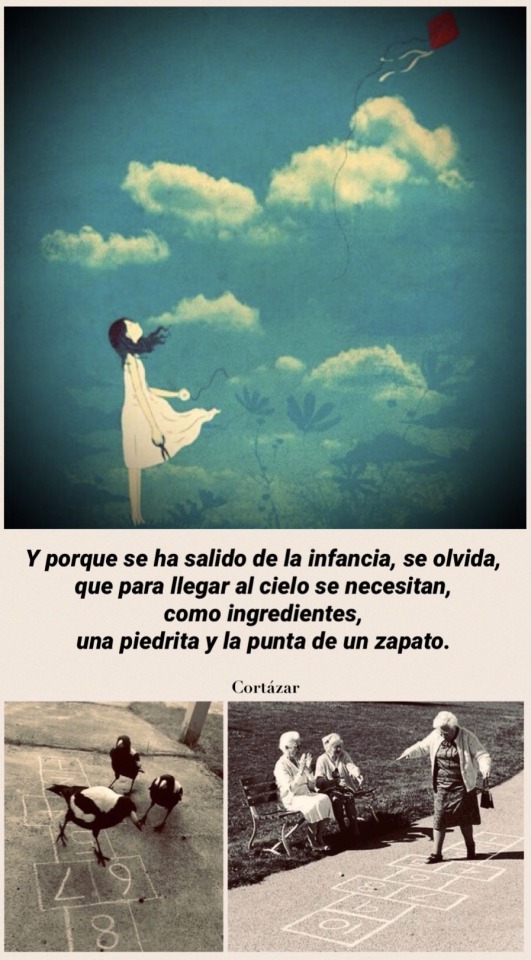
La distinción entre pasado, presente y futuro es sólo una ilusión obstinadamente persistente.
Einstein.
Por más que recordemos el pasado o anticipemos el futuro, vivimos en el presente. El tiempo fluye en el sentido de que el presente se va actualizando de modo constante, esa es una verdad irrefutable.
Todos tenemos una verdad en común, nacemos y morimos, lo único que nos diferencia es lo que hacemos en el medio entre esos dos eventos, lo que hacemos en cada presente.
Aún hay tiempo para dejar salir al niño que anhelaba trepar los árboles y jugar con su amigo imaginario. No permitamos que la vida nos vaya endureciendo el corazón y démosle el permiso a nuestras palabras de seguir siendo gráciles, dulces y gentiles.
¡Enhorabuena! para aquellos ancianos que jamás olvidaron su cofre de los tesoros y llegaron al umbral de sus vidas, con la paz y la dulzura propia de quien envejece con tranquilidad y nunca se quedó corto de tiempo, cuando se trataba de llenar su ser fundamental, para los que nunca olvidaron la verdadera esencia de las cosas y sueñan aún con esa infancia añorada de globos surcando como fuego el cielo.

A veces en las noches
cuando suenan las campanas,
mi infancia recorre tierras extrañas,
la oigo venir desde lejos, en la distancia,
de otros cielos, de otra arcilla,
de profundidades amarillas.
Porque todavía,
todavía mi infancia
viene a buscarme,
con un golpe en las piernas
y en sus labios una sonrisa salvaje.
Ella se camufla en el aire
porque ella es muy linda, muy suave y muy frágil,
y tiene miedo de la gente grande.
Me viene a buscar
a mi cuarto de sueños,
de lejanos mundos sin orilla,
y me cuenta que con una hoja de papel
aún navega los mares,
y atraviesa las selvas deslizándose por los árboles.
Después entre lloriqueos me cuenta
sentada sobre mis rodillas
que una nube se llevó su cometa,
y que un niño casi la atropella con su bicicleta.
Mi amor, entonces
le cura las heridas
porque con su presencia
mi cuarto de sueños
se convierte en un valle de vida.
¡Mi infancia, mi infancia!
con un golpe en las piernas
todavía viene a buscarme.
Todas las personas mayores fueron niños, pero pocos lo recuerdan.
Antonio de Saint-Exupéry.
Solo un niño puede ser completamente feliz porque no tiene aún la mancha del pasado y el mecanismo cruel de su memoria apenas rueda. No le han tendido la trampa, mientras tanto, mientras juega…
OIGO UNA VOZ QUE ME DICE: ¡CUIDADO, QUE TE ESTÁN VELANDO!
La muerte es algo que no debemos temer porque, mientras somos, la muerte no es y cuando la muerte es, nosotros no somos. Antonio Machado. Paráfrasis de Epicuro.
Los entierros más antiguos de los que se tienen conocimiento en los que se manipulaba al muerto de una forma ceremonial, datan del cuarto milenio antes de Cristo. Dicen que en aquel tiempo, los sumerios amortajaban a sus difuntos metiéndolos en cestos de juncos trenzados. Y los textos antiguos dicen que lo hacían “movidos por el temor”

El temor es la clave para entender el invento del ataúd, que no es sino un intento de hacer imposible el retorno del muerto. Así, que no es de extrañar que la mayoría de ceremonias y ritos funerarios tengan un origen común: el horror ante la posibilidad de que el espíritu del fallecido pueda regresar al lugar donde transcurrió su existencia. Y ese horror data incluso del tiempo del hombre primitivo. Dicen que éste puso todo su celo, cuidando al máximo los detalles, temeroso de que cualquier error u omisión en el desarrollo del ritual pudiera luego perturbar la paz de los vivos.

Existen textos que cuentan que en el norte de Europa se tomaban medidas de máxima seguridad amputándole los pies al difunto después de decapitarlo, así se aseguraban de que los muertos no perseguirían a los vivos.
A ese temor ancestral, se debe así mismo, la costumbre entre otros pueblos europeos antiguos de enterrar a los seres queridos lejos del poblado. Se buscaba engañar al difunto, para evitar que pudiera regresar al poblado y para no correr riesgos daban varias vueltas por los alrededores para despistar al muerto.

En muchas culturas antiguas se acostumbraba sacar el cadáver por la parte trasera de la casa, incluso se llegaba a abrir un boquete en la pared por el que sacaban el cuerpo del fallecido, ese orificio era tapado inmediatamente después del entierro. De esa manera el difunto no sería nunca capaz de volver a su antiguo hogar.

El ataúd tiene su origen en estos antiguos temores, si bien es cierto que la costumbre de enterrar al difunto bajo metro y medio de tierra podía ser suficiente, por si acaso se tomó la precaución de enterrarlo en una caja de madera y clavar la tapa. Los arqueólogos aseguran que el número de clavos era exagerado. Y no contentos con esto, se tapaba la entrada de la tumba con una enorme y pesadísima losa, que es el origen de la lápida.

Ningún pueblo antiguo veía con buenos ojos acercarse al lugar del eterno reposo, movidos por un temor irracional a ser arrastrados al mundo de ultratumba.
El temor a la muerte fue el origen del luto. Siempre se representó con el color negro, y era una forma de mantenerse vigilantes durante los primeros meses, considerados los más peligrosos. Con el luto se pretendía evitar que el alma del muerto penetrara en el cuerpo de los familiares vivos. Era un intento de esconderse, un camuflaje para despistar el alma en pena.
Tras el fallecimiento del marido, la viuda lloraba desconsolada sobre su ataúd, cubriéndose con un largo velo negro. Pero esto no lo hacía movida por el respeto al difunto, sino por puro y físico miedo al espíritu merodeador del marido, el velo era una máscara o disfraz protector para desorientar el alma del esposo.

En la antigua Roma enterraban a sus muertos al atardecer, con un propósito muy concreto: embolatar al muerto. Llevaban antorchas porque al llegar al cementerio ya había anochecido del todo. Ellos suponían que al espíritu del difunto le iba quedar imposible encontrar el camino de regreso, debido a la oscuridad.

Hoy, nuestra sensibilidad, respecto al ritual funerario ha cambiado mucho, hemos echado mano de otras posibilidades para deshacernos de los restos mortales. Como si tanto la vida como la muerte hubieran perdido la solemnidad que tuvo en el pasado.
Hace algunos años, al regresar de un entierro, escuché a alguien diciéndole a los familiares del difunto que movieran todos los muebles de la casa, que cambiaran todo de lugar, pues así el espíritu del difunto jamás reconocería su casa cuando deambulara perdido buscando su hogar, y así regresaría al otro mundo y podría descansar en paz.

Me puse a pesar que todas aquellas medidas que tomamos para que el muerto “descanse en paz”, no es sino una estrategia brillante de máxima seguridad, para que seamos los vivos, los que descansemos en paz.

Imagínense ustedes lo que sería, que después de tantos cuidados por mandar al muerto sin pasaje de vuelta al otro mundo, dos o tres meses después, llamaran a la puerta, y ante nosotros se apareciera el finado aquel con páginas amarillas en mano y diciéndonos: ¡hum, casi me pierdo!

The great Judy Davis in her first Oscar-nominated performance as E.M. Forster’s troubled heroine Adela Quested, a repressed English tourist on a transformative journey, in the lush screen adaptation A Passage to India (1984, David Lean)
Post link
Debra Winger looking very classical Hollywood as wartime prostitute Suzy DeSoto in Cannery Row (1982, David S. Ward)
Post link
Reluctant wartime prostitute Suzy DeSoto (Debra Winger) strikes unlikely sparks with ballplayer turned marine biologist Doc (Nick Nolte) in the quirky John Steinbeck adaptation Cannery Row (1982, David S. Ward)
Post link
Skid row alcoholic Wanda Wilcox (Faye Dunaway) becomes involved with hard-drinking writer Henry Chinaski (Mickey Rourke, as the alter ego of Charles Bukowski) in the semi-autobiographical character study Barfly (1987, Barbet Schroeder)
Post link
the paradox of banning books detailing the failure of society as a result of banning books

“With equal pace, impartial Fate Knocks at the palace, as the cottage gate.”
- Horace
@anya.g.rowe









